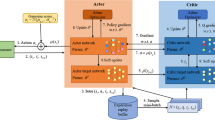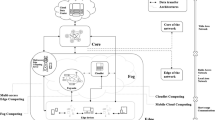Abstract
In the Internet of vehicles (IoV), various applications emerging to provide users with safe, reliable, and comfortable driving services have caused explosive demand for computing capability. It is very challenging for vehicles with limited resources to meet the real-time demand. Mobile Edge Computing (MEC) is a convenient solution that utilizes computing resources at the network edge to enhance the capability of vehicles. With the help of MEC, vehicles can offload parts of tasks to nearby MEC servers to reduce the response cost. However, with the increase of vehicles, the unbalanced load among servers may lead to the unbalanced resource allocation and the degradation of task completion ratio. To address this problem, we first propose an SDN-enabled vehicular edge computing network architecture to facilitate the management of IoV with a global view. Then, the joint optimization problem of computation offloading and load balancing is formulated as a sequential decision problem to minimize the system cost in terms of time and energy. An A3C-based solution is proposed to solve the offloading decisions. Further, we develop the simple computation resource allocation scheme and calculation method of offloading ratio, respectively. Finally, the simulation results demonstrate the superior performance of our proposed algorithm compared to the benchmark solutions.











Similar content being viewed by others
References
Zhou H, Xu W, Chen J, Wang W (2020) Evolutionary v2x technologies toward the internet of vehicles: Challenges and opportunities. Proc IEEE 108(2):308–323
Sun Y, Guo X, Sheng Z, Jiang Z, Niu Z (2018) Learning-based task offloading for vehicular cloud computing systems. In: 2018 IEEE International Conference on Communications (ICC 2018), pp 1–7
Shi J, Du J, Wang J, Wang J, Yuan J (2020) Priority-aware task offloading in vehicular fog computing based on deep reinforcement learning. IEEE Trans Veh Technol 69(12):16067–16081
Zhang K, Mao Y, Leng S, Vinel A, Zhang Y (2016) Delay constrained offloading for mobile edge computing in cloud-enabled vehicular networks. In: 2016 8th International Workshop on Resilient Networks Design and Modeling (RNDM), pp 288–294
Guo H, Liu J, Ren J, Zhang Y (2020) Intelligent task offloading in vehicular edge computing networks. IEEE Wirel Commun 27(4):126–132
Khayyat M, Elgendy IA, Muthanna A, Alshahrani AS, Alharbi S, Koucheryavy A (2020) Advanced deep learning-based computational offloading for multilevel vehicular edge-cloud computing networks. IEEE Access 8:137052–137062
Tang D, Zhang X, Li M, Tao X (2020) Adaptive inference reinforcement learning for task offloading in vehicular edge computing systems. In: 2020 IEEE International Conference on Communications Workshops (ICC Workshops), pp 1–6
Wang J, Feng D, Zhang S, Tang J, Quek TQS (2019) Computation offloading for mobile edge computing enabled vehicular networks. IEEE Access 7:62624–62632
Sun J, Gu Q, Zheng T, Dong P, Valera A, Qin Y (2020) Joint optimization of computation offloading and task scheduling in vehicular edge computing networks. IEEE Access 8:10466–10477
Wang R, Zeng F, Deng X, Wu J (2021) Joint computation offloading and resource allocation in vehicular edge computing based on an economic theory: walrasian equilibrium. Peer-to-Peer Netw Appl 14:3971–3983
Zhao J, Li Q, Gong Y, Zhang K (2019) Computation offloading and resource allocation for cloud assisted mobile edge computing in vehicular networks. IEEE Trans Veh Technol 68(8):7944–7956
Ke H, Wang J, Deng L, Ge Y, Wang H (2020) Deep reinforcement learning-based adaptive computation offloading for mec in heterogeneous vehicular networks. IEEE Trans Veh Technol 69(7):7916–7929
Peng H, Shen X (2020) Deep reinforcement learning based resource management for multi-access edge computing in vehicular networks. IEEE Trans Netw Sci Eng 7(4):2416–2428
Zhan W, Luo C, Wang J, Wang C, Min G, Duan H, Zhu Q (2020) Deep-reinforcement-learning-based offloading scheduling for vehicular edge computing. IEEE Internet Things J 7(6):5449–5465
Beraldi R, Mtibaa A, Alnuweiri H (2017) Cooperative load balancing scheme for edge computing resources. In: 2017 Second International Conference on Fog and Mobile Edge Computing (FMEC), pp 94–100
Song N, Gong C, An X, Zhan Q (2016) Fog computing dynamic load balancing mechanism based on graph repartitioning. China Communications 13(3):156–164
Wu H, Chen L, Shen C, Wen W, Xu J (2018) Online geographical load balancing for energy-harvesting mobile edge computing. In: 2018 IEEE International Conference on Communications (ICC), pp 1–6
Truong NB, Lee GM, Ghamri-Doudane Y (2015) Software defined networking-based vehicular adhoc network with fog computing. In: 2015 IFIP/IEEE International Symposium on Integrated Network Management (IM), pp 1202–1207
He Y, Liang C, Zhang Z, Yu FR, Zhao N, Yin H, Zhang Y (2017) Resource allocation in software-defined and information-centric vehicular networks with mobile edge computing. In: 2017 IEEE 86th Vehicular Technology Conference (VTC-Fall), pp 1–5
Xia W, Zhang J, Quek TQS, Jin S, Zhu H (2020) Mobile edge cloud-based industrial internet of things: Improving edge intelligence with hierarchical sdn controllers. IEEE Veh Technol Mag 15(1):36–45
Zhao L, Zhao W, Hawbani A, Al-Dubai AY, Min G, Zomaya AY, Gong C (2021) Novel online sequential learning-based adaptive routing for edge software-defined vehicular networks. IEEE Trans Wirel Commun 20(5):2991–3004
Hou X, Ren Z, Wang J, Cheng W, Ren Y, Chen KC, Zhang H (2020) Reliable computation offloading for edge-computing-enabled software-defined iov. IEEE Internet Things J 7(8):7097–7111
Khadir A, Seno S (2021) Sdn-based offloading policy to reduce the delay in fog-vehicular networks. Peer-to-Peer Netw Appl 14:1261–1275
Misra S, Bera S (2020) Soft-van: Mobility-aware task offloading in software-defined vehicular network. IEEE Trans Veh Technol 69(2):2071–2078
Zhang H, Wang Z, Liu K (2020) V2x offloading and resource allocation in sdn-assisted mec-based vehicular networks. China Commun 17(5):266–283
Volodymyr M, Adriá PB, Mehdi M, Alex G, Koray K (2016) Asynchronous methods for deep reinforcement learning. In: 2016 Proceedings of the 33rd International Conference on International Conference on Machine Learning, pp 1928–1937
Ye Q, Zhuang W, Zhang S, Jin AL, Shen X, Li X (2018) Dynamic radio resource slicing for a two-tier heterogeneous wireless network. IEEE Trans Veh Technol 67(10):9896–9910
IEEE (2011) IEEE draft standard for information technology - telecommunications and information exchange between systems - local and metropolitan area networks - specific requirements - part 11: wireless lan medium access control (mac) and physical layer (phy) specifications. IEEE P80211-REVmb/D12, November 2011, pp 1–2910
Funding
This work was supported in part by the National Natural Science Foundation of China (Grant No.61771002); the National Education Ministry of China (No.NGII20170636); and the Fundamental Research Funds for the Central Universities (No.2021CZ102).
Author information
Authors and Affiliations
Corresponding author
Ethics declarations
Conflicts of interest
The authors declare no conflict of interest.
Additional information
Publisher’s Note
Springer Nature remains neutral with regard to jurisdictional claims in published maps and institutional affiliations.
Rights and permissions
Springer Nature or its licensor (e.g. a society or other partner) holds exclusive rights to this article under a publishing agreement with the author(s) or other rightsholder(s); author self-archiving of the accepted manuscript version of this article is solely governed by the terms of such publishing agreement and applicable law.
About this article
Cite this article
Lu, L., Yu, J., Du, H. et al. A3C-based load-balancing solution for computation offloading in SDN-enabled vehicular edge computing networks. Peer-to-Peer Netw. Appl. 16, 1242–1256 (2023). https://doi.org/10.1007/s12083-022-01412-6
Received:
Accepted:
Published:
Issue Date:
DOI: https://doi.org/10.1007/s12083-022-01412-6




